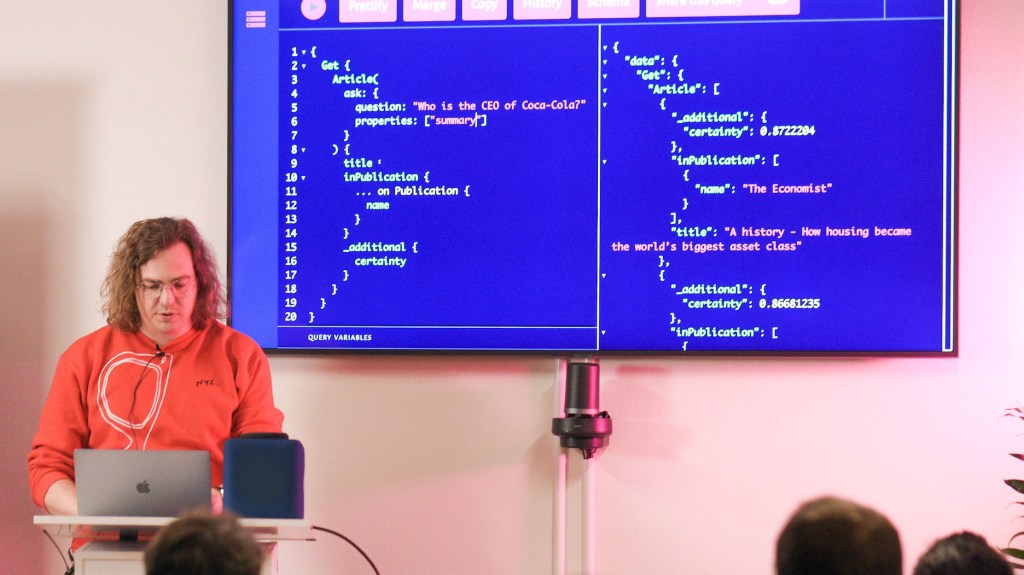Companies sit on a lot of unstructured data and often don’t have the capabilities to get much out of it.
Now imagine having a way to store data and actually be able to ask it questions, for example, “When did ABC Company sign its first contract with us?” or “Show me videos that contain blue skies.”
That is what SeMI Technologies is building with Weaviate, a vector search engine. It is a unique type of AI-first database using machine learning models outputting vectors, also known as embeddings, hence the name vector search engine, said Bob van Luijt, SeMI’s CEO and co-founder.
He explained that vector search engines are not new — Google Search is an example of a solution built on top of a vector search engine. However, SeMI’s goal is to commoditize this technology and has an open source business model so that anyone can use it.
Van Luijt gave my colleague, Alex Wilhelm, a look under the hood of the technology last year by creating a semantic search engine that does question-answering on 2021 Techcrunch articles.
“Everybody can use the tech, and we have tools and services for those companies who need this,” van Luijt added. “We don’t create or distribute the actual models — this is something companies like Huggingface or OpenAI do, or companies make models themselves. But having the models is one thing, using them to power your search and recommendation systems in production is another, and this is exactly what Weaviate solves.”
Since founding the company in 2019 with CTO Etienne Dilocker and COO Micha Verhagen, van Luijt has seen SeMI’s technology inspire over 100 use cases, including startups, like Keenious or Zencastr, creating new businesses based on the new possibilities a vector search engine gives them, and uses where the results provided by Weaviate directly help people, for example, in medical.
Some of van Luijt’s personal favorites were ones that he said were more “esoteric,” including the vectorization of and search through the human genome, the mapping of the whole world in vectors, or so-called graph embeddings, that can be easily searched through with Weaviate, like a demo SeMI created on Meta Researches’ graph embeddings.
SeMI raised a $1.2 million seed in August 2020 from Zetta Venture Partners and ING Ventures and since then has been on the radar of venture capital companies. Since then, its software has been downloaded almost 750,000 times, growth of about 30% per month. Van Luijt didn’t give specifics on the company’s growth metrics, but did say the number of downloads can correlate to sales of enterprise licenses and managed services. In addition, the spike in usage and understanding of the added value of Weaviate has caused all growth metrics to go up, and the company to exhaust its seed funding.
Though the seed funding was gone, the company was not actively seeking new funding. However, when the SeMI co-founders entertained conversations with Cortical Ventures, a new fund from ex-Datarobot founders and New Enterprise Associates (NEA), van Luijt said the firms showed them how they would be supporting the business.
“It was truly ‘pinch my arm jaw-dropping’ awesome,” he added. “Everything they’ve done in the past, the teams that are supporting us, was exactly what we’re looking for, and I can say from, although very fresh experience, all the amazing stories are true.”
Those conversations led to NEA and Cortical co-leading a new financing round of $16 million in Series A dollars.
SeMI intends to deploy the new funding into hiring U.S. and European talent and doubling down on its open source community for both Weaviate and vector search in general. It will also increase its focus on go-to-market and products around the open-source core, and make first steps on research where machine learning overlaps with computer science.
Meanwhile, van Luijt believes that we are looking at the next wave of database technology that started with the SQL wave that ushered in big winners, like Oracle and Microsoft, followed by a second wave was the no-SQL database wave, with winners like MongoDB and Redis.
“We are now at the brink of a new generation of databases, those who are AI-first, and Weaviate is an example of this,” he added. “We need to educate the market not only about Weaviate but also vector search databases, or AI-first databases for that matter. This is an extremely exciting thing to do because machine learning brings something uniquely awesome to the table. For example, having your database answer natural language questions over millions — or even billions — of documents, or ‘understand’ what millions of photos or video contain.”
The first win: Getting early customers to take a chance with you































Comment